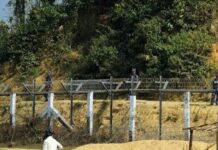Home fears militant attacks amid volatile politics after Oct 24

Detectives collect samples from the scene at Jamiatul Ulum Al Islamia Madrasa in Chittagong city yesterday where a blast left seven students wounded the day before. Law enforcers are trying to identify the explosives. The Islamic education centre is run by a Hefajat-e Islam leader.
Banned militant outfits plan to carry out terrorist attacks in the country once political turmoil over the polls-time government takes a turn for the worse after October 24, said top officials of the home ministry and police.
“The recent capture of some militants and Hefajat-e Islam men, and the explosion at a Chittagong Madrasa on Monday are not isolated incidents. There is no doubt that they will try to create anarchy,” said a senior police official, preferring anonymity.
These elements made attempts to carry out terrorist attacks but couldn’t succeed due to the government agencies’ constant watch, raids and capture of militants over the past few years, said the official.
“It, however, does not mean that they will not be successful if there is any political unrest.”
The five Islamist outfits that have been banned so far for militant and anti-government activities are Jama’atul Mujahideen Bangladesh (JMB), Harkatul Jihad al Islami (Huji), Shahadat-e Al-Hikma, Jagrata Muslim Janata Bangladesh (JMJB) and Hizb ut-Tahrir.
But these outfits have either opened new fronts or are secretly working with little-known organisations to continue their operation.
Huji established links with some Hefajat leaders, as it was having difficulties in carrying out operation following the ban on the outfit in 2005, said sources in Chittagong police.
Hefajat Nayeb-e-Ameer Mufti Izharul Islam Chowdhury, who set up the madrasa where the explosion occurred, is a suspected Huji activist.
He was reportedly present at the press conference in Dhaka on April 30, 1992 when Afghan war returnees announced the launch of Huji in Bangladesh.
Rab personnel detained him on December 16, 2010 for his alleged links with Huji.
Meanwhile, Sanwar Hossain, additional deputy commissioner of Bomb Disposal Unit at Dhaka Metropolitan Police, said the improvised explosive devices recovered from the madrasa are similar to those found in a JMB hideout in the capital’s Jurain in 2009.
“We suspect that Hefajat men may have received expertise from JMB operatives,” he told The Daily Star.
In the wake of potential threats, the government has intensified vigilance and asked the intelligence agencies to keep a close watch on the Hefajat-controlled Qawmi madrasas, a home ministry high-up told The Daily Star yesterday on condition of anonymity.
“Monday’s blast at the Hefajat leader’s madrasa exposed its [Hefajat] militant nature. Intelligence agencies are gathering information about the source from which the Hefajat men got the explosives, and how many Hefajat men have been trained to make explosives.”
Shafiqul Islam, commissioner of Chittagong Metropolitan Police, yesterday said the Hefajat men control four Qawmi madrasas in Chittagong city, and has influence over at least 12 madrasas there.
“Following the explosion, the Hefajat men escaped the madrasa [Jamiatul Ulum Al Islamia Madrasa at Lalkhan] through a hidden passage.”
“Hefajat men built several hidden exits at the madrasa located in a remote hilly area,” he added.
Asked about the confusion over the explosion and the law enforcers’ delay in raiding the madrasa, Additional Home Secretary Main Uddin Khandaker said, “We are disappointed at the delay. We will look into it.”
Though the explosion occurred around 11:30am, law enforcers raided the madrasa nearly five hours later.
There had been confusion after the incident, as madrasa principal and Hefajat leader Izharul told reporters that the blast occurred from a laptop charger while some students were cooking on a stove with the room’s door shut.
Police couldn’t confirm the cause of the explosion until they recovered handmade grenades from the spot nearly nine hours after the incident.
Source: The Daily Star









